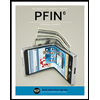
1.
Concept Introduction:
Debt ratio: The debt ratio measures the percentage of shares financed by debt, the higher debt ratio is considered riskier for the business, because a higher debt ratio indicates the larger portion of assets are funded by external debt, it is computed as total liabilities divided by the total of assets.
The Debt ratio for S during the current year and prior year.
2.
Concept Introduction:
Debt ratio: The debt ratio measures the percentage of shares financed by debt, the higher debt ratio is considered riskier for the business, because a higher debt ratio indicates the larger portion of assets are funded by external debt, it is computed as total liabilities divided by the total of assets.
Whether the financial leverage of S has been increasing or decreasing in the current year.
3.
Concept Introduction:
Debt ratio: The debt ratio measures the percentage of shares financed by debt, the higher debt ratio is considered riskier for the business, because a higher debt ratio indicates the larger portion of assets are funded by external debt, it is computed as total liabilities divided by the total of assets.
If investment in S is risky or less risky when compared with A and G.
Want to see the full answer?
Check out a sample textbook solution
Chapter 2 Solutions
FINANCIAL & MANAGERIAL ACCOUNTING (ACCES
- I need help with this solution and general accounting questionarrow_forwardCozy Retreats currently sells 420 Standard hot tubs, 580 Luxury hot tubs, and 190 Premium model hot tubs each year. The firm is considering adding a Comfort model hot tub and expects that, if it does, it can sell 340 of them. However, if the new hot tub is added, standard sales are expected to decline to 290 units while Luxury sales are expected to decline to 310. The sales of the Premium model will not be affected. Standard hot tubs sell for an average of $8,900 each. Luxury hot tubs are priced at $14,500 and the Premium model sells for $22,000 each. The new Comfort model will sell for $12,300. What is the value of erosion?arrow_forwardSalma Production uses direct labor cost as the allocation base for applying MOH to WIP. The budgeted direct labor cost for the year was $850,000. The budgeted manufacturing overhead was $722,500. The actual direct labor cost for the year was $910,000. The actual manufacturing overhead was $745,000. A. What was Salma's predetermined manufacturing overhead rate per direct labor dollars? B. How much MOH was applied to WIP during the year?arrow_forward
- Hello tutor solve this question and accountingarrow_forwardThe total factory overhead for Leicester Manufacturing is budgeted for the year at $756,000. Leicester manufactures two product lines: standard lamps and premium lamps. These products each require 4 direct labor hours to manufacture. Each product is budgeted for 8,000 units of production for the year. Determine the factory overhead allocated per unit for premium lamps using the single plantwide factory overhead rate.arrow_forwardI need help with this solution and accounting questionarrow_forward
- https://investor.exxonmobil.com/sec-filings/annual-reports/content/0000034088-25-000010/0000034088-25-000010.pdf Use link to help me answer my question please in picturearrow_forwardHello tutor solve this question and accountingarrow_forwardCan you solve this general accounting question with accurate accounting calculations?arrow_forward
- Please provide the solution to this general accounting question with accurate financial calculations.arrow_forwardI need help with this general accounting problem using proper accounting guidelines.arrow_forwardStarbucks Corporation wants to make a profit of $32,000. It has variable costs of $65 per unit and fixed costs of $18,000. How much must it charge per unit if 5,000 units are sold?arrow_forward
 PFIN (with PFIN Online, 1 term (6 months) Printed...FinanceISBN:9781337117005Author:Randall Billingsley, Lawrence J. Gitman, Michael D. JoehnkPublisher:Cengage Learning
PFIN (with PFIN Online, 1 term (6 months) Printed...FinanceISBN:9781337117005Author:Randall Billingsley, Lawrence J. Gitman, Michael D. JoehnkPublisher:Cengage Learning Pfin (with Mindtap, 1 Term Printed Access Card) (...FinanceISBN:9780357033609Author:Randall Billingsley, Lawrence J. Gitman, Michael D. JoehnkPublisher:Cengage Learning
Pfin (with Mindtap, 1 Term Printed Access Card) (...FinanceISBN:9780357033609Author:Randall Billingsley, Lawrence J. Gitman, Michael D. JoehnkPublisher:Cengage Learning EBK CONTEMPORARY FINANCIAL MANAGEMENTFinanceISBN:9781337514835Author:MOYERPublisher:CENGAGE LEARNING - CONSIGNMENT
EBK CONTEMPORARY FINANCIAL MANAGEMENTFinanceISBN:9781337514835Author:MOYERPublisher:CENGAGE LEARNING - CONSIGNMENT Intermediate Financial Management (MindTap Course...FinanceISBN:9781337395083Author:Eugene F. Brigham, Phillip R. DavesPublisher:Cengage Learning
Intermediate Financial Management (MindTap Course...FinanceISBN:9781337395083Author:Eugene F. Brigham, Phillip R. DavesPublisher:Cengage Learning





